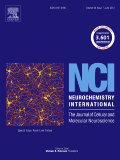
REDOX REPORT
Scope & Guideline
Empowering Discoveries in Clinical Biochemistry
Introduction
Aims and Scopes
- Oxidative Stress Mechanisms:
Research on how oxidative stress contributes to cellular damage and various diseases, including cancer, neurodegenerative disorders, and metabolic syndromes. - Antioxidant Therapies:
Exploration of natural and synthetic antioxidants, their mechanisms of action, and their potential therapeutic implications in mitigating oxidative stress. - Redox Signaling Pathways:
Investigation of redox-sensitive signaling pathways, such as Nrf2 and others, that regulate cellular responses to oxidative stress. - Mitochondrial Function and Dysfunction:
Studies on mitochondrial health, including the role of mitochondria in redox homeostasis and the consequences of mitochondrial dysfunction in disease. - Translational Research:
Research bridging laboratory findings with clinical applications, focusing on how insights into redox biology can inform treatment strategies in various diseases. - Environmental and Dietary Factors:
Examination of how environmental exposures and dietary components influence oxidative stress and overall health through redox mechanisms.
Trending and Emerging
- Ferroptosis and Cell Death Mechanisms:
Recent publications show a significant increase in research on ferroptosis, a form of regulated cell death linked to oxidative stress, highlighting its relevance in various diseases, including cancer and neurodegeneration. - Neuroprotection and Neurodegenerative Diseases:
There is a growing emphasis on the neuroprotective effects of antioxidants and the role of oxidative stress in neurodegenerative diseases, indicating heightened interest in brain health. - Redox Modulation in Metabolic Disorders:
Emerging studies focus on the role of redox biology in metabolic diseases such as diabetes and obesity, exploring how oxidative stress influences disease progression and treatment outcomes. - Nanotechnology in Antioxidant Delivery:
Innovative approaches using nanotechnology to enhance the delivery and efficacy of antioxidants are trending, reflecting a shift towards advanced therapeutic strategies. - Impact of Environmental Stressors:
Research is increasingly addressing how environmental factors, including pollution and diet, affect redox status and contribute to health outcomes, indicating a broader scope of inquiry.
Declining or Waning
- Basic Mechanistic Studies:
There seems to be a reduction in purely mechanistic studies that do not directly relate to health outcomes or therapeutic applications, as the focus shifts towards translational research. - Role of Specific Nutrients in Oxidative Stress:
Research specifically targeting individual nutrients and their antioxidant properties appears to be waning, possibly due to a shift towards more complex dietary patterns and holistic approaches. - Animal Models with Limited Relevance:
Studies using animal models that do not translate well to human conditions are becoming less common, reflecting a trend towards more clinically relevant research. - Single-Agent Therapeutics:
The exploration of single-agent antioxidant therapies is declining, as there is a growing interest in combination therapies and multi-target approaches to improve efficacy. - Historical Reviews on Oxidative Stress:
There seems to be a decline in review articles that merely summarize past findings without offering new insights or future directions in redox research.
Similar Journals

Cell Stress
Connecting Researchers to Transform Molecular MedicineCell Stress is a prestigious, peer-reviewed open access journal dedicated to advancing research in the fields of biochemistry, genetics, molecular biology, cancer research, and physiology. Published by SHARED SCIENCE PUBLISHERS OG in Austria, this journal has rapidly established itself since its inception in 2017, achieving Q1 status in multiple categories, indicative of its high impact and quality. With an impressive Scopus ranking—holding a top percentile position in its respective fields—Cell Stress aims to foster interdisciplinary collaboration and disseminate cutting-edge findings that enhance our understanding of cellular stress mechanisms and their implications in health and disease. The journal's commitment to open access since its launch ensures that critical research is accessible to a global audience, thereby facilitating the exchange of knowledge among researchers, professionals, and students alike. Address your submissions or inquiries to AM BLUMENHAG 25-4, Graz 8010, Austria, and contribute to this dynamic platform that is shaping the future of molecular medicine.

FREE RADICAL BIOLOGY AND MEDICINE
Leading the Charge in Free Radical Research since 1987FREE RADICAL BIOLOGY AND MEDICINE, published by Elsevier Science Inc, is a premier journal dedicated to the field of biochemistry and medical physiology. With an ISSN of 0891-5849 and an E-ISSN of 1873-4596, this journal stands out with its impressive ranking in the 2023 category quartiles: Q1 in Biochemistry and Q1 in Physiology (medical). Specifically, it has achieved a remarkable position of 29th out of 438 in Biochemistry and 8th out of 113 in Physiology, placing it firmly in the 93rd percentile of its field, as per Scopus rankings. Since its inception in 1987, the journal has focused on advancing the understanding of free radicals and their role in biological processes, encompassing a wide range of topics from oxidative stress to therapeutic applications. Although it does not currently offer open access, the journal's rigorous peer-review process and impactful research ensure that it remains a valuable resource for researchers and professionals seeking to explore the intricate relationships between free radicals and health. The journal's headquarters are located at STE 800, 230 Park Ave, New York, NY 10169, reflecting its esteemed place within the scientific community and commitment to high-quality research.

Redox Biology
Unveiling the Secrets of Redox Biology for a Healthier FutureRedox Biology, published by Elsevier, stands as a premier open-access journal in the fields of biochemistry, clinical biochemistry, and organic chemistry. Since its inception in 2013, the journal has provided a vibrant platform for researchers to disseminate high-quality findings that advance our understanding of redox biology and its implications in health and disease. With an impressive impact factor and ranked Q1 across multiple chemistry disciplines, Redox Biology is recognized for its significant contributions to the scientific community, drawing attention from a global audience. This journal aims to foster a rich dialogue among scientists, clinicians, and students, emphasizing the critical role of redox processes in biological systems. Located in the Netherlands, Redox Biology has become an essential resource for those seeking to explore the nuanced interactions of reactive species and their roles in cellular function and pathology, making it a must-read for anyone interested in the forefront of biochemistry research.

JOURNAL OF PHYSIOLOGY AND BIOCHEMISTRY
Advancing the Frontiers of Physiology and BiochemistryJOURNAL OF PHYSIOLOGY AND BIOCHEMISTRY, published by Springer in the Netherlands, serves as a pivotal platform for disseminating high-quality research within the fields of physiology, biochemistry, and related biomedical sciences. With an impressive impact factor reflected in its categorization as Q2 in Biochemistry and Q1 in Medicine (miscellaneous), this journal fosters a vibrant community of scholars dedicated to advancing knowledge and innovation. The journal’s broad scope encompasses a wide range of topics from cellular mechanisms to systemic physiology, making it relevant for both theoretical and applied sciences. Researchers and practitioners are encouraged to utilize the available Open Access options to reach a wider audience. The journal’s continuous contribution to the scientific dialogue since its inception in 1996 positions it as a key resource for professionals and students alike, facilitating the exploration of cutting-edge topics and collaborative research opportunities.

BIOFACTORS
Transforming Biological Insights into Clinical SolutionsBIOFACTORS, an esteemed journal published by Wiley, serves as a pivotal resource in the fields of Biochemistry, Clinical Biochemistry, and Molecular Medicine. With ISSN 0951-6433 and E-ISSN 1872-8081, the journal has established its reputation since its inception in 1988, showcasing a rich history of scientific inquiry and innovation. Recognized for its high academic standards, it currently holds a Q1 ranking in key categories, including Biochemistry and Medicine (miscellaneous), and ranks in the top 10% for Clinical Biochemistry according to Scopus metrics, reflecting its impact and influence in the scientific community. Although it does not offer Open Access, BIOFACTORS provides researchers the opportunity to publish and disseminate high-quality studies that advance our understanding of biological factors and their clinical implications. The journal actively encourages contributions that bridge the gap between laboratory findings and clinical applications, making it a vital platform for both seasoned researchers and emerging scholars in the life sciences.

JOURNAL OF TRACE ELEMENTS IN MEDICINE AND BIOLOGY
Advancing Knowledge on Trace Elements in Medicine and BiologyThe JOURNAL OF TRACE ELEMENTS IN MEDICINE AND BIOLOGY, published by Elsevier GmbH, stands as a leading platform for disseminating pivotal research in the interdisciplinary field that bridges biochemistry, inorganic chemistry, and molecular medicine. With an impact factor reflective of its high-quality submissions and significant contribution to the scientific community, this journal currently holds a Q2 ranking in Biochemistry and a Q1 ranking in Inorganic Chemistry, underlining its esteemed status among peers. Since its inception in 1995 and continuing through to 2024, the journal has fostered a dynamic discourse on the fundamental roles of trace elements in biological systems, incorporating studies that range from their biochemical functions to their impact on health and disease. Researchers, professionals, and students alike can access a wealth of knowledge, missing Open Access options notwithstanding, making it indispensable for those at the forefront of scientific investigation in medicine and biology.

ANTIOXIDANTS & REDOX SIGNALING
Illuminating the Role of Antioxidants in Health and DiseaseANTIOXIDANTS & REDOX SIGNALING, published by MARY ANN LIEBERT, INC, is a premier journal dedicated to advancing the understanding of oxidative stress, antioxidants, and redox biology in various health contexts. With an impressive track record since its inception in 1999, this journal has continually evolved, currently converging towards 2024 as a core resource for researchers in biochemistry, cell biology, and molecular medicine. It holds a distinguished position in Q1 across several categories, including Biochemistry, Cell Biology, and Clinical Biochemistry, reflecting its critical role in disseminating high-quality research that impacts the fields of physiology and medicine. Despite not being an open-access journal, ANTIOXIDANTS & REDOX SIGNALING is renowned for its rigorous peer-review process and wide reach, ensuring that published articles are both influential and accessible to professionals, academia, and students alike. Researchers can benefit from its comprehensive articles that delve into cutting-edge discoveries and emerging therapies related to oxidative stress and its biological implications.

MOLECULAR BIOLOGY
Unlocking the Secrets of Life at the Molecular LevelMOLECULAR BIOLOGY, published by PLEIADES PUBLISHING INC, serves as a vital repository for the dissemination of innovative research within the fields of biochemistry, genetics, and molecular biology. With an ISSN of 0026-8933 and an E-ISSN of 1608-3245, this journal has been a mainstay in the scientific community since its inception, embracing its deep historical roots from 1971 to the present. Recognized for its qualitative contributions, MOLECULAR BIOLOGY is ranked in the Q3 quartile for Biophysics and Q4 for Structural Biology, placing it among select journals in its domain. Researchers and students alike benefit from its rigorous peer-reviewed articles, which focus on all aspects of molecular mechanisms and interactions. The journal's inclusion in prestigious databases underlines its commitment to academic excellence. The editorial board is dedicated to fostering the sharing of influential findings, making it an essential resource for advancing knowledge and innovation in molecular biology.

NEUROCHEMISTRY INTERNATIONAL
Unveiling Insights in Cellular and Molecular NeuroscienceNEUROCHEMISTRY INTERNATIONAL, published by Pergamon-Elsevier Science Ltd, offers a premier platform for researchers and professionals in the realms of cell biology and cellular and molecular neuroscience. Established in 1980 and continuing its passion for advancing the field, this esteemed journal enhances scientific collaboration with a notable 2023 Q2 ranking in both relevant categories, placing it among the top-tier publications in its discipline with a Scopus rank of 23/97 for Cellular and Molecular Neuroscience. With its focus on groundbreaking research, the journal provides a wealth of vital data and insights that drive forward our understanding of neurochemistry and its implications in health and disease. While not an Open Access journal, NEUROCHEMISTRY INTERNATIONAL is integral for professionals, academics, and students aiming to stay at the forefront of neurobiological research innovations, making significant contributions to both academia and clinical applications.

CELL
Leading the charge in innovative biochemistry research.CELL is a premier academic journal in the field of Biochemistry, Genetics, and Molecular Biology, published by CELL PRESS. Founded in 1974, this esteemed journal has steadfastly contributed to advancing our understanding of cellular processes and organisms, making it integral for researchers and practitioners alike. With an impressive impact factor that places it in the Q1 category of its field, CELL ranks #1 out of 221 in general biochemistry and genetics, achieving a remarkable 99th percentile in Scopus rankings. Though it is not currently an open-access publication, the journal regularly disseminates high-quality research that impacts the scientific community significantly. Researchers, students, and professionals seeking to stay at the forefront of innovative discoveries and methodologies in molecular biology will find CELL an invaluable resource through its comprehensive articles and reviews.